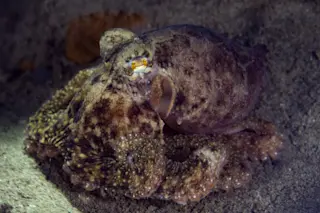A neuroscientist and a marine biologist got together and decided to give octopuses MDMA. It sounds like a joke, but it really happened, and the results reveal something unique about our neurocircuitry and human evolution.
Eric Edsinger is an octopus researcher at the University of Chicago who recently helped sequence the genome of Octopus bimaculoides—the California two-spot octopus. Like most octopuses, this color-changing cephalopod is asocial, meaning it likes to be alone most of the time, unless it’s trying to mate.
But when given MDMA, a drug well known for boosting emotional empathy and prosocial behavior in humans (i.e. making you really, really want to fraternize), these octopuses also seemed to want to hang out with each other, even if they weren’t trying to find a mate.
This is interesting not only because these octopuses don’t normally behave this way, but also because the last common ancestor we shared was ...














